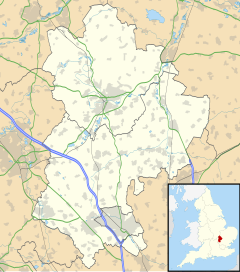Odell, Bedfordshire
| Odell | |
|---|---|
| Odell shown within Bedfordshire | |
| Population | 287 (2011 Census) |
| OS grid reference | SP963575 |
| Unitary authority | |
| Ceremonial county | |
| Region | |
| Country | England |
| Sovereign state | United Kingdom |
| Post town | BEDFORD |
| Postcode district | MK43 7 |
| Dialling code | 01234 |
| Police | Bedfordshire |
| Fire | Bedfordshire and Luton |
| Ambulance | East of England |
| EU Parliament | East of England |
| UK Parliament | |
Odell is a village and civil parish in the north of the county of Bedfordshire in England that lies to the north-west of the county town of Bedford, near the villages of Harrold, Felmersham, Sharnbrook and Carlton.
Evidence of occupation includes the remains of a farm dating from just before the Roman invasion. It comprised two round timber buildings inside a fenced enclosure, and two cremation pits. After the conquest its survival and prosperity may have been linked to there being a Roman presence at Irchester.
The evidence is that the farm was abandoned in the 4th century and remained unoccupied until the 6th or 7th century. After this it no doubt experienced a chequered history owing to attacks by Danish Vikings.
In the early 11th century the area where the present village lies was part of five or more hides that were under Levenot, a thane of King Edward the Confessor, who owned much land.
At that time the village was already known by the name of Wadelle, or Wadehelle. This name means "the hill where woad grows". Woad (Isatis tinctoria) was important as a source of indigo blue textile dye.
After the battle of Hastings in 1066, William the Conqueror and his Normans progressively took control of the whole of England. In many cases regions were given to fellow soldiers to manage. The lands owned by Levenot, along with the title of baron, were passed to a Walter Flandrensis, the Count of Flanders, who is thought to have fought alongside William.
Walter is mentioned as early as 1068, and sometimes as Walter de Wahul (Wahul being a variant of Wadehelle). His arrival marked the start of a period of centuries during which a family bearing an Odell-type name continued to hold most of these lands.
Odell was recorded in the Domesday book of 1086 as a parish of the Hundred of Willey.
...
Wikipedia

